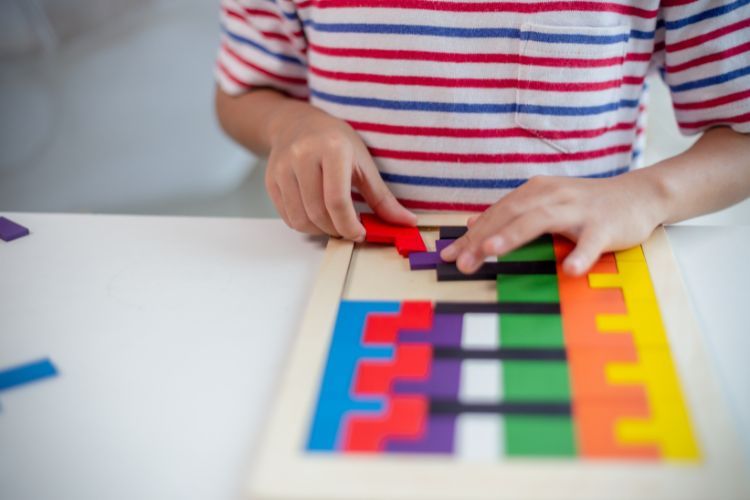Who says math has to be a drag? It can actually be fun and rewarding when approached through puzzles. The best part? They’re good for the brain!
Here are some benefits of solving math puzzles that might just change how you think about mathematics.
1. Sharpens Problem-Solving Skills
One of the biggest takeaways from solving math puzzles is how much they improve your problem-solving abilities.
Math puzzles don’t always come in neat equations. They can be word problems, riddles, logic grids, or sequences that require you to sift through clues, identify patterns, and make connections.
These are exactly the skills puzzles train you to do. As you work through them, you get better at spotting the key details, figuring out what the problem is about, and finding the right approach to solve it.
In fact, research shows that puzzle-based learning can help students become better problem solvers. And, it goes even deeper than that—puzzles stimulate the brain’s frontal lobe, which is responsible for decision-making.
2. Enhances Logical Thinking
Think about the last time you tackled a tricky math puzzle. What was your game plan?

If you’re like most people, you start by analyzing the puzzle. You ask yourself, “What do I know, and what do I need to find out?” From there, you look for logical connections, sequences, and patterns to guide your thought process.
You then test different strategies. If something doesn’t pan out, you reassess your assumptions and try new solutions until you arrive at the correct answer.
This back-and-forth process is what enhances your logical thinking. You learn to break down a complex challenge into smaller chunks and reason through them—what works, what doesn’t, and why.
3. Increases Mathematical Understanding
Math tends to be rigid and rule-based, but puzzles take those abstract concepts and turn them into brain teasers that you genuinely want to tackle.
Take math puzzles like Sudoku and Kakuro, for example. They present you with a specific set of constraints and challenge you to think critically within those limits. Similarly, geometry puzzles help you grasp concepts like symmetry, areas, and fractions in a hands-on way.
Mathematical ideas are less daunting and more relatable when there’s a sense of mystery and game-like quality to them.
4. Builds Confidence to Tackle Complex Problems
Let’s be honest: solving math problems can be pretty scary. However, math puzzles take away that fear by presenting the problem in a more fun, engaging format. When we’re in “puzzle mode,” we tend to be more relaxed, curious, and willing to experiment.
Each time you solve a puzzle, no matter how small, you’re reinforcing your ability to think critically and creatively.
So, why not make math puzzles a regular part of your routine? Not only will you hone your skills, but you’ll also cultivate a positive attitude toward mathematics.
5. Promotes Creativity
In 2022, two high school students cracked a 2000-year-old math puzzle. They proved the Pythagorean theorem using trigonometry alone, a feat that generations of mathematicians thought was impossible. They went on to find five more proofs!
Of course, this isn’t your typical brain teaser. But the point here is how creativity can lead to amazing discoveries. And what better way to spark that creativity than through puzzles?
Unlike traditional math problems, math puzzles often don’t require memorized formulas and routine steps. Instead, they force you to think outside the box and come up with unique solutions.
This is where lateral thinking comes in. You approach the puzzle from new angles and try fresh ideas. That’s why those “aha!” moments are all the more satisfying—they’re the fruits of your creativity breaking through!
6. Improves Memory and Concentration

Working on math puzzles requires focus and attention to detail. You might need to remember previous steps and keep track of multiple variables at once.
As you juggle numbers, patterns, and rules in your head, you’re giving your memory a rigorous workout. This, in turn, improves your ability to retain and recall information in other areas of your life.
7. Strengthens Your Brain
Time really does fly by when you’re doing puzzles. This is a sign that your brain is hard at work.
Puzzles employ different cognitive skills. For instance, riddles tap into language and general knowledge, while logic puzzles use deductive reasoning. With math puzzles, you’re flexing your numerical smarts and pattern recognition.
What’s particularly fascinating is how this mental exercise can benefit you in the long run. Regularly engaging in puzzles might help keep your mind sharp as you age and delay cognitive decline, according to research.
And the rush you feel when you finally solve a math puzzle? That’s your brain rewarding you with a hit of the feel-good hormone dopamine.
Final Thoughts
Ready to give your brain a boost? Grab a pen and paper, pick up a puzzle, and enjoy the benefits of solving math puzzles. Improve your logical thinking, problem-solving skills, creativity, and understanding of mathematical concepts—all while having fun!
